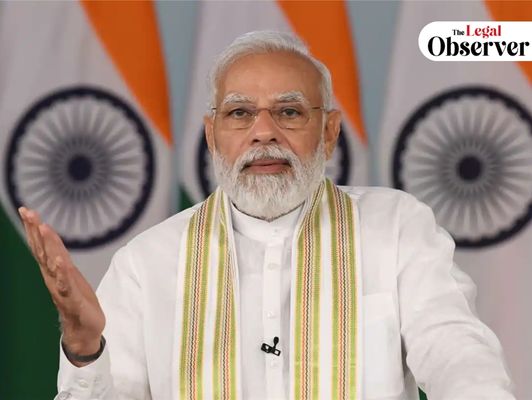Prime Minister Narendra Modi pointed to one of the biggest challenges people are facing, adding that a prudent judicial system is essential for a competent state and a harmonious society.
Prime Minister Narendra Modi said that the ambiguity of the law creates complexity, so the new law should be written in a clear way in local languages to promote justice so that even the poor can easily understand it. The legal language should not be a barrier to citizens.
His video was broadcast at the session of the two-day ‘All India Conference of Law Ministers and Law Secretaries’ at Ekta Nagar in Kevadia near the ‘Statue of Unity’ in Gujarat.
PM Narendra Modi also said that in the past eight years, the government has scrapped more than 1,500 of his old, outdated and irrelevant laws, many of which date back to British rule. The judiciary is serious about solving this problem. In this “Amrit Karl” we must work together to deal with this.
Systems such as alternative dispute resolution and Lok Adalats are helping to reduce the burden on the courts, making services easier for the poor.
The use of local languages in the legal system is emphasized, the important role local languages play in promoting justice and legal ambiguity or obscurity of law creates complexity.
If the law was comprehensible to ordinary people, it would have a different effect. In some countries they have two kinds of decisions when drafting laws. While carefully explaining legal terms using technical terms, we also write in the local language so that the general public can understand it.
Therefore, when drafting legislation, the focus should be on making sure that even the poor can understand the new legislation. Some countries have provisions that determine the validity of a law during its drafting.
The country is making a lot of great efforts in this direction. Logistics and infrastructure support is needed so that legal language does not become a hurdle for citizens and all states work in this direction.
We must also create a mother tongue legal system for young people. You need to do the work of delivering law courses in your native language, writing law in plain language, and providing a digital library of important Supreme Court and Supreme Court judgements in local languages.
This will help increase the legal knowledge of the public and reduce their fear of heavy legal terminologies. The prime minister added that the peculiarity of Indian society is that it has pursued internal reforms along the path of development for thousands of years.
Our society has voluntarily abandoned its outdated laws, bad manners and traditions. We must know that progress is hindered when they become stereotypes.
The government has paid special attention to easing the burden on people by abolishing outdated laws, and over the past eight years more than 1,500 outdated and irrelevant laws have been abolished.
Many of these laws have been in place since the days of British rule, and more than 32,000 compliance cases have been cut to remove legal hurdles that hindered innovation and well-being. These changes are for people’s convenience.
Such colonial laws still exist in many states and need to be abolished and new laws enacted. Apart from that, a review of the country’s existing laws with a particular focus on ease of life and justice will also prove helpful.
And the Systems such as virtual listening and producing have become part of the legal system. Electronic submission of cases is also encouraged.
With the advent of his 5G in the country, such systems have gained momentum and many changes are inherent. Many states should update and upgrade their systems with this in mind.
The issue of expedited procedures for undertrials and said the state government should do its best to do so.
A sensitive judicial system is an essential requirement for an efficient state and a harmonious society.
Modi also addressed the issue of undertrials in the meeting of Chief Justices of the High Court meeting. And the three pillars to the constitution are the judicial, legislative and executive branches which must work together.
The Constitution is the first priority of our legal system. The judicial, legislative and executive branches emerged from the pockets of the Constitution. Our governments, parliaments and courts are sons of the same mother. All three must take India to new heights.






